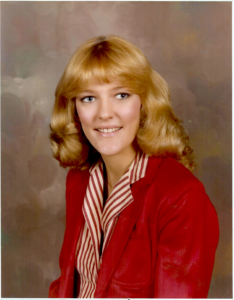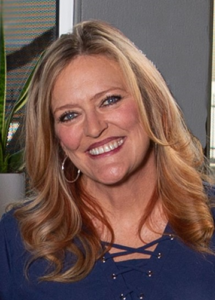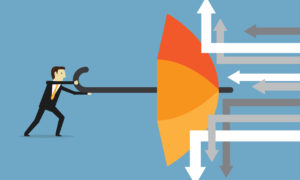
The photo Dr. Sorrenson sent in along with her application to optometry school. Dr. Sorrenson says that the ability to be bold and take calculated risks has served her well in her career.
The Perfect Girl vs. The Brave Boy
“We are raising our girls to be perfect, and we’re raising our boys to be brave” – Reshma Saujani, the founder of Girls Who Code.
By Laurie Sorrenson, OD, FAAO
Nov. 1, 2023
I found the above quote while doing research to prepare for my presentation at the 2023 Women in Optometry Leadership Conference, themed “Be Bold.” Reshma Saujani, the visionary founder of Girls Who Code, observed that in society girls are often encouraged to be cautious, careful and to strive for perfection in their actions. Boys, on the other hand, are often urged to take risks, be adventurous and exhibit boldness.
Intriguingly, I also found a study from The Journal of Pediatric Psychology, conducted in an emergency room setting, revealing that parents are “four times more likely to tell girls than boys to be more careful.” Saujani’s insight aligns with this finding, highlighting the contrasting ways in which girls and boys are nurtured.
The Impact of Being Raised to Be Careful & Perfect
When girls (or boys) are repeatedly told to be “careful” and “perfect,” it can cultivate a fear of making mistakes. This fear can hinder their ability to make decisions confidently. They may become overly self-critical, second-guess their choices and avoid taking risks, which can affect their personal and professional growth.
As you might remember, Dori Carlson, OD, told me about CEO Genome, (In-depth analysis of ghSMART’s database including a sample of over 2,600 leaders drawn from a data set of 17,000 CEOs and C-suite executive assessments, 13,000 hours of interviews and two decades advising CEOs and executive boards) which concluded that DECISIVENESS was THE most important trait to be a successful CEO.
Other Articles to Explore
Know Yourself
I believe knowing yourself and understanding your weaknesses and strengths can help you become a better leader, better optometrist and a better businessperson. If you know indecision is a problem for you, developing a mentorship network, seeking the counsel of consultants and, crucially, implementing their recommendations, can be immensely beneficial.
I consider myself pretty decent at being decisive, perhaps a bit too much! LOL!
I rely on my son and practice partner, Eric Hammond, OD, and my husband, Joel Hickerson, to help me not make decisions too hastily and slow me down a little. Additionally, I seek guidance from various colleagues and consultants such as Bethany Fishbein, OD, of The Power Practice and Joe DeLoach, OD, from Practice Compliance Solutions.
I have come to realize that my parents did not emphasize the notion of being overly cautious with me. I know I was jumping off the diving board while still in diapers, playing football, climbing trees and engaging in activities like crawdad fishing in the creek, and even creating my own babysitting business when I was 12 years old, going door to door with my handwritten flyers. I have no memory of my parents using the words, “be careful.” LOL!
Embracing our boldness, evaluating our strengths, and learning from those around us, are ways for us all to be better in our optometric business world.
Be Decisive, Be Brave, Be Bold!
 Laurie Sorrenson, OD, FAAO, is president of Lakeline Vision Source in Cedar Park, Texas, and the Professional Editor of Review of Optometric Business (ROB). To contact her: lsorrenson@gmail.com.
Laurie Sorrenson, OD, FAAO, is president of Lakeline Vision Source in Cedar Park, Texas, and the Professional Editor of Review of Optometric Business (ROB). To contact her: lsorrenson@gmail.com.



























